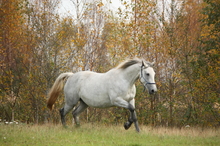Days are getting shorter and nights colder with the seasonal changes. As pastures begin to provide less forage and grass loses some of its nutritional quality, most horse owners need to supplement pasture feedings with another forage source such as quality hay, hay cubes or a complete pelleted feed.

Meeting horse's nutritional needs during cold weather
Cooler weather may up your horses need for feed with higher nutritional value so consider higher quality hay and the addition of cubes of pelleted feed when necessary.
Preconditioning horses before the onset of cold temperatures helps to reduce the effect of cold weather on nutritional needs.
Here is a list of questions you can ask yourself about your horses and the answers will form the basis of your nutritional plan for cool weather feeding.
- How much and how hard is your horse going to work this winter?
- How much grazing will they have access to?
- Is there snow in your region?
Not only will you save money, but preventing damage and loss of nutritional value are very important when it comes to storing feed for your horse. Many of the same rules that apply to the storing and feeding of hay are also important in storing and feeding grain concentrates, commercial feeds, supplements and other products.
Here are 15 rules to follow to preserve the quality of your hay, grain, feed stuffs, supplements, medications and other supplies for your horse as cooler weather arrives:
- Be sure to keep all hay, feed stuffs and other supplies dry by making sure there are no roof leaks in any storage areas or any water drainage problems.
- Organize your storage by using indoor storage areas in sheds and barns wherever possible for hay, grains, complete feeds, supplements and other feed stuffs for your horse.
- Keep hay off the floor or ground by placing it on wooden pallets which you can often get from local businesses at no cost to you.
- Stack hay for good air flow and check hay often for heat build-up by inserting a thermometer through a pipe or inserting a metal rod into the center of bales, waiting 15 minutes and feeling the rod to see if heat is building up.
- Use older hay first by stacking new hay behind it.
- Keep hay in compacted bales as much as possible to decrease breakdown in quality because of exposure to air and sunlight
- If storing hay outside, protect it from sun, rain and snow with tarps or covers and stack in a way for good water runoff.
- Check each bale as you open it to make sure it isn't moldy and doesn't contain foreign objects or other debris.
- Rodent proof your storage area and keep an eye out for rats and mice that might contaminate your hay. Having a barn cat can be of great help in keeping the rodent population under control.
- If you purchase grain or other feed stuffs in sacks, either store the sacks in metal bins or galvanized garbage cans with tight lids or empty the contents into metal bins or garbage cans to preserve quality and keep rodents and insects from damaging them.
- Always store all hay, grain, supplements and medications in a horse-proof area where horses cannot get to them. This will prevent accidental engorgement which can cause gastric dilatation and founder or the ingestion of supplements or medications that are a danger to the horse. If your horse gets into your grain supply or stored supplements and medications, call your veterinarian immediately.
- Read and follow the directions for storage on all complete feeds, supplements and medications. If necessary, keep refrigerated or store in a cool dark place according to directions.
- Always discard any damaged or outdated feed stuff, supplement, or medication to make sure horses stay healthy.
- Keep special feeds, supplements and medications for each horse separately, and give only to the horse for which they are meant to be used.
- Maintain good housekeeping procedures throughout your storage, stable, tack, and barn areas to minimize pests, debris, and any contaminants that might reduce the quality of hay and other feed stuffs.
